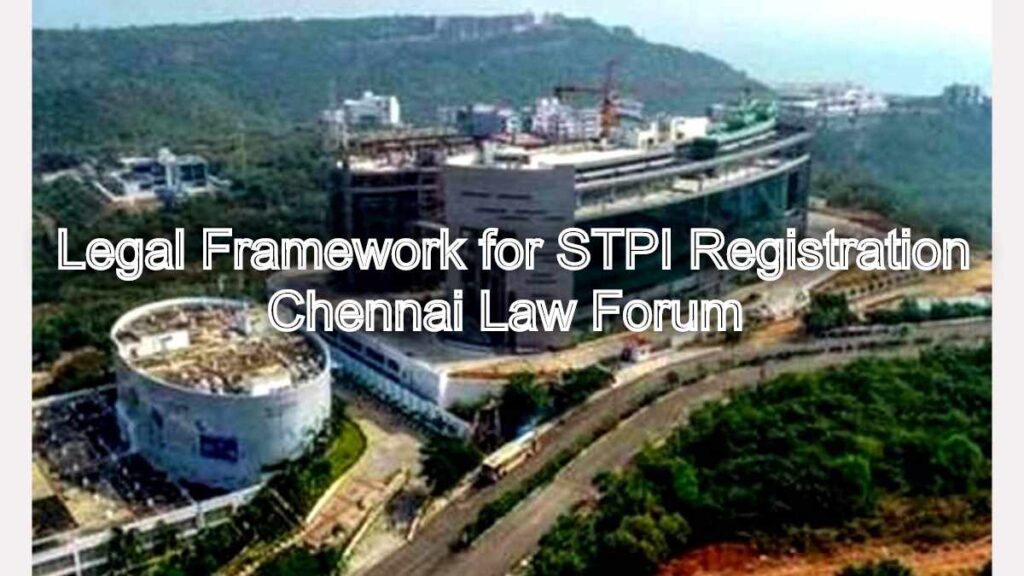
Legal Framework for STPI Registration: India’s IT sector is a powerhouse. It drives significant economic growth. Many companies seek to optimize their export operations. They often look towards the Software Technology Parks of India (STPI) scheme. This scheme offers a structured legal framework. It provides various benefits for IT exporters. At Chennai Law Forum | Best Advocates Legal Services 24×7, we specialize in this area. We offer expert guidance. We help IT exporters navigate the complexities of STPI registration.
Legal Framework for STPI Registration: Expert Guidance for IT Exporters: Chennai Law Forum
The Foundation: Understanding STPI’s Role
Legal Framework for STPI Registration: The Software Technology Parks of India (STPI) is a cornerstone of India’s IT export ecosystem. It acts as an autonomous society. It operates under the Ministry of Electronics and Information Technology (MeitY). STPI’s primary objective is clear: to promote and boost software and ITES exports from India. It achieves this through a specific legal and regulatory framework.
Historical Context and Evolution:
Legal Framework for STPI Registration: STPI was established in 1991. Its creation aimed to provide a conducive environment for software exports. Initially, it offered substantial income tax exemptions under Section 10A and 10B of the Income Tax Act, 1961. These tax holidays significantly incentivized IT companies. While these specific tax benefits have expired for most new units, STPI remains crucial. It continues to play a vital role in facilitating exports. It offers other critical advantages.
Current Benefits of STPI Registration:
Despite changes in tax laws, STPI registration still provides key operational benefits. First, it offers a single-window clearance mechanism. This streamlines governmental approvals. It reduces bureaucratic hurdles. Second, STPI units can import capital goods and software duty-free. This exemption significantly lowers setup costs. Third, they benefit from high-speed data communication facilities. This robust infrastructure is essential for global IT operations. Fourth, STPI provides simplified Customs procedures. This makes import and export processes smoother. Lastly, STPI units can maintain 100% foreign equity participation through the automatic route. This attracts significant foreign direct investment.
The Legal Framework: Key Acts and Regulations
Legal Framework for STPI Registration: STPI’s operations are governed by a robust legal framework. This framework draws from various central acts and government policies. Understanding these laws is paramount for compliance.
1. Software Technology Park (STP) Scheme:
This is the core scheme under which STPI units operate. It is a 100% export-oriented scheme. It focuses specifically on software development and ITES exports. The scheme integrates concepts from Export Oriented Units (EOUs) and Export Processing Zones (EPZs). It aims to provide a single-point contact service. This facilitates export operations for member units.
2. Foreign Trade (Development & Regulation) Act, 1992 (FTDR Act):
This Act empowers the central government to formulate and implement the Foreign Trade Policy (FTP). The FTP outlines export-import policies. STPI units function within the ambit of this policy. For instance, the FTP details provisions for duty-free imports. It also covers export obligations. Compliance with the latest FTP is mandatory for all STPI units.
3. Foreign Exchange Management Act, 1999 (FEMA):
All IT exporters, including STPI units, engage in foreign exchange transactions. FEMA governs these transactions. It mandates strict compliance regarding receiving foreign currency. It also dictates the realization and repatriation of export proceeds. Furthermore, it covers reporting requirements to the Reserve Bank of India (RBI). Failure to comply with FEMA can lead to severe penalties. This often includes monetary fines.
4. Income Tax Act, 1961:
While specific tax holidays have ended, the Income Tax Act still affects STPI units. They are now subject to corporate income tax like other entities. However, they benefit from general deductions. Proper accounting and tax planning are crucial. Understanding relevant sections ensures compliance.
5. Customs Act, 1962:
STPI units operate as bonded warehouses. This allows them to import goods duty-free. Consequently, they are subject to Customs regulations. They must maintain meticulous records of imported and exported goods. Regular reporting to Customs authorities is necessary. Any violation can attract penalties.
6. Goods and Services Tax (GST) Laws:
Software exports from STPI units are considered “zero-rated supplies” under GST. This means no GST is charged on these exports. However, STPI units can claim Input Tax Credit (ITC) on goods and services used for export purposes. Correct invoicing, GST registration, and timely filing of GST returns are essential for seamless operations and ITC recovery.
The Registration Process: Navigating the Legal Steps
The STPI registration process is structured. It involves several legal and procedural steps. Expert guidance ensures a smooth and successful registration.
1. Eligibility Assessment:
First, our lawyers assess your company’s eligibility. The applicant company must be an Indian company. It can also be a subsidiary or branch of a foreign company. It must be primarily engaged in software development or ITES for export. It needs to demonstrate a viable business plan.
2. Application Submission:
Next, a comprehensive application is prepared. This includes your company’s Certificate of Incorporation. It also requires the Memorandum and Articles of Association. A detailed project report is mandatory. This report outlines your business activities. It includes projected export turnover. The application is submitted to the jurisdictional STPI Director. We ensure all required documents are accurate and complete.
3. Letter of Permission (LoP) and Legal Agreement:
Upon approval, STPI issues a Letter of Permission (LoP). This is a crucial document. It grants the unit STPI status. Subsequently, the unit must execute a Legal Agreement (LA) with STPI. This agreement outlines the terms and conditions of operation. It commits the unit to fulfill its export obligations.
4. Bonded Warehouse Formalities:
After LoP and LA, the unit’s premises are “bonded” by Customs. This allows duty-free import of capital goods. It also enables duty-free procurement from the Domestic Tariff Area (DTA). Maintaining proper Customs records is vital. Regular inventory reconciliations are required.
5. Importer-Exporter Code (IEC):
Every exporter, including an STPI unit, must obtain an Importer-Exporter Code (IEC). This code is issued by the DGFT. It is a mandatory prerequisite for undertaking any import or export activity.
Post-Registration Compliance: Ongoing Legal Obligations
STPI registration is not a one-time event. It involves continuous legal compliance. Adherence to post-registration requirements is crucial for retaining benefits and avoiding penalties.
1. Export Obligation (EO):
STPI units must adhere to a specific export obligation (EO). This is typically defined as a “Positive Net Foreign Exchange Earning.” It means the value of exports must exceed the value of imports. Regular monitoring of NFE is essential. Non-fulfillment can lead to financial penalties.
2. Softex Form Filing:
All software exports, whether physical or through data communication, must be declared. This is done by filing Softex forms. These forms are certified by STPI. They are then submitted to the Authorized Dealer (AD) bank. Softex filing ensures compliance with FEMA regulations. It facilitates the realization of export proceeds.
3. Annual Performance Reports (APRs):
STPI units must submit Annual Performance Reports (APRs). These reports detail the unit’s export performance. They provide data on NFE, imports, and other operational metrics. Timely submission of accurate APRs is mandatory. Non-submission can lead to de-bonding or other actions.
4. Customs Bonding and Periodical Reports:
The Customs bonding requires continuous compliance. This includes maintaining proper stock registers for imported goods. Periodical reports must be submitted to Customs authorities. Any unauthorized removal or disposal of goods can result in severe penalties.
De-bonding and Exit Formalities: A Legal Process
An STPI unit might decide to exit the scheme. This process is called “de-bonding.” It involves specific legal and procedural steps.
1. Application for De-bonding:
The unit must submit a formal application to STPI. This application states the reasons for de-bonding. It includes a declaration of compliance with all obligations.
2. Settlement of Dues and Export Obligation:
Before de-bonding, the unit must settle all outstanding Customs duties. This includes duties on imported goods that have not met their export obligation. Any NFE shortfall must be regularized.
3. Customs Clearance:
Customs authorities inspect the unit’s premises. They verify all records. They ensure all duties are paid. A no-objection certificate (NOC) from Customs is mandatory for final de-bonding.
Expert Guidance from Chennai Law Forum
Navigating the STPI legal framework requires specialized knowledge. At Chennai Law Forum | Best Advocates Legal Services 24×7, we provide comprehensive support. Our senior lawyers are experts in IT export regulations.
Pre-Registration Advisory:
We offer thorough consultations. We assess your business model. We advise on the feasibility and benefits of STPI registration. We help you make an informed strategic decision.
Documentation and Application Support:
Our team assists in preparing all necessary legal documents. We ensure accurate and compliant application submission. We liaise with STPI authorities on your behalf.
Post-Registration Compliance:
We provide ongoing legal support for compliance. We guide you on export obligations. We help with Softex filings. We assist with Annual Performance Reports. This ensures continuous adherence to regulations.
Dispute Resolution and De-bonding:
Should any issues arise, we represent you. We handle disputes with STPI or Customs. We also manage the entire de-bonding process. We ensure a smooth and legally compliant exit.
Frequently Asked Questions
Q1: What is the primary purpose of STPI (Software Technology Parks of India) registration for IT exporters?
A1: The primary purpose of STPI registration is to promote and boost software and ITES (Information Technology Enabled Services) exports from India. STPI provides a specific legal and regulatory framework that offers various operational benefits, such as duty-free imports of capital goods and software, simplified Customs procedures, and access to high-speed data communication facilities.
Q2: Have the tax benefits for STPI units expired?
A2: Yes, the significant income tax exemptions under Section 10A and 10B of the Income Tax Act, 1961, have largely expired for most new STPI units. However, STPI registration still provides non-tax advantages like duty-free imports, single-window clearance, and access to robust infrastructure, which remain valuable for IT exporters.
Q3: What is the “export obligation” (EO) that STPI units must meet?
A3: The export obligation for STPI units requires them to achieve a “Positive Net Foreign Exchange Earning.” This means the total value of their exports must exceed the total value of their imports. This obligation is a key compliance requirement, and failure to meet it can lead to penalties.
Q4: Which legal acts are most relevant to STPI unit operations in India?
A4: Several key legal acts govern STPI unit operations. These include the Foreign Trade (Development & Regulation) Act, 1992, the Foreign Exchange Management Act, 1999 (FEMA), the Customs Act, 1962, and the Goods and Services Tax (GST) laws. Compliance with these acts ensures the legal sanctity and smooth functioning of an STPI unit.
Q5: How can Chennai Law Forum assist an IT exporter with STPI registration and compliance?
A5: Chennai Law Forum provides expert legal guidance from the initial stage. We offer pre-registration advisory, assist with drafting and submitting applications and all necessary legal documents, and provide ongoing compliance support for export obligations, Softex filings, and Annual Performance Reports. We also offer dispute resolution and guidance through de-bonding processes if needed.
Conclusion
STPI registration offers significant advantages for IT exporters in India. However, it operates within a stringent legal framework. Understanding the provisions of the FTDR Act, FEMA, Income Tax Act, Customs Act, and GST laws is critical. Meticulous compliance is not just about avoiding penalties. It is about leveraging opportunities for sustained growth.
At Chennai Law Forum | Best Advocates Legal Services 24×7, we are committed to empowering IT exporters. We provide the expert legal guidance you need. We simplify complex regulations. We help you take charge of your STPI registration and compliance. Partner with us. Ensure your IT export business thrives legally and efficiently.
Read More
- Legal Strategies for Smooth Business Restructuring: Expert Lessons from Real Cases
- Resolve Marital Issues with Chennai’s Best Counseling Advocates: Legal + Emotional Support
- Restraining Orders and Legal Protection Against Narcissistic Abusers: Expert view
- The Role of Corporate Bylaws in Strengthening Corporate Governance: Expert View
- Cross-Border Mergers and Acquisitions: Key Legal Challenges and Solutions: Expert View
- How Mergers and Acquisitions Affect Shareholder Rights and Voting Power: Expert View
- Corporate Governance and ESG (Environmental, Social, Governance): A Legal Overview
- Software Technology Parks of India (STPI)

